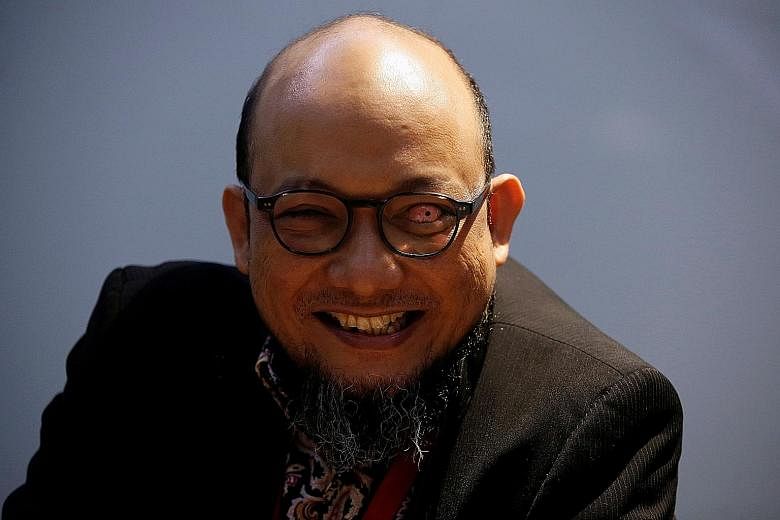Plans by Indonesia's anti-graft watchdog to remove more than 50 of its graft investigators and personnel, while subjecting two dozen more to retraining, amounts to a "purge" aimed at weakening the once-vaunted agency, said one of its top investigators.
The Corruption Eradication Commission (KPK) last month said 75 of its personnel had failed a tailor-made civics exam as part of an effort to fold the once independent body into the civil service under the auspices of the police.
Among those who fell afoul of the controversial National Perspectives Exam (TWK) was Mr Novel Baswedan, cousin of Jakarta Governor Anies Baswedan. He spent 10 months recuperating in Singapore following a 2017 acid attack that blinded him in one eye and left him with only a sliver of sight in the other.
"If the KPK is successfully weakened then all the hardworking people with integrity in the KPK will be purged," Mr Novel told The Straits Times in an interview late last week. "I believe in the future, people will be afraid to do the right thing."
At stake, anti-corruption activists say, is the independence of a body that was once one of the country's most trusted.
Since its founding in 2003, the KPK has been at the forefront of Indonesia's slow climb from one of the most corrupt countries globally in the 1990s to a more middling showing.
The KPK has jailed nearly 900 people. They included former Cabinet ministers, politicians and other officials.
In December, it nabbed the former social affairs minister Juliari Batubara on suspicion of accepting kickbacks linked to the Covid-19 relief of rice, oil and other staples intended for the country's most vulnerable.
The KPK in 2018 convicted and sentenced to 15 years in prison the former speaker of Parliament Setya Novanto for his connection to 2.3 trillion rupiah (S$214 million) in kickbacks linked to the roll-out of a new compulsory identification card.
At issue is the civics exam stemming from a 2019 law introduced by the administration of President Joko Widodo to convert the KPK from a standalone entity into one under the control of the civil service. A big irony is that the KPK now reports to the police force, reputedly a corrupt institution whose top officers the anti-graft commission had investigated in past years.
To its proponents, including the KPK's chairman, police general Firli Bahurli, the TWK exam is aimed at rooting out extremists and aimed at individual staff.
But some who took the assessment said questions included probes into personal religious practices, and views on religious and sexual minorities, according to media reports.
"There was absolutely no attempt to get rid of certain employees in the TWK," according to the statement made available by a KPK spokesman.
"All KPK employees are important assets for the institution in its efforts to eradicate corruption."
Other investigators facing dismissal because of their exam results included Mr Ambarita Damanik, who is also credited with a lead role in ex-House speaker Setya's case as well as probes into the police force.
But Mr Novel, himself a former police officer, said the test was "insulting" and invasive. It included questions regarding sexual practices and attitudes towards women.
In interviews, assessors refused to identify themselves, he said.
Mr Novel said questions also included whether he would follow orders even if it violated procedure.
"I was asked whether I would obey superiors when they intervene in certain matters and if I'm asked to do something that is wrong," he said.
"I answered, 'yes', as long as I'm following the principles of the KPK - if I'm acting with honesty, integrity, independence and responsibility."
Controversy over the civics exam and the possible ouster of Mr Novel threaten to erode further public perception of an investigating body once among the country's most revered.
When it was formed in 2003 as part of a raft of measures aimed at rebuilding the government after 33 years under former president Suharto, the KPK had wide-ranging powers of investigation and prosecution.
But the new 2019 rules gave an outside supervisory body the power to reject arrest warrants, wiretaps and other methods of investigation, which critics say have slowed arrests.
The supervisory body, known as the KPK Supervisory Board, is appointed by the president. Previously, investigators needed approval only from the five top officials of the KPK.
Mr Novel blames outside meddling for the failure to nab more suspects following high-profile arrests, including the November 2020 detention of the former fisheries minister Edhy Prabowo for accepting bribes in connection with issuing export permits for lobster spawn.
"The initial success of the arrests is only the first act," Mr Novel told ST. "If we had not been weakened, we would have been able to expose other important cases."
Mr Laode Syarif, a former KPK investigator who is now executive director of the governance think-tank Kemitraan, told ST: "The most important ingredient is public trust." He was referring to maintaining the independence of corruption watchdogs.
"Now people doubt the KPK's integrity," he said. Kemitraan is managed by the UN Development Programme.
A survey published last June in the newspaper Kompas showed that public approval rating of the KPK had halved from 82 per cent of survey respondents in 2017, though other surveys suggest many Indonesians retain a favourable view of the commission.

